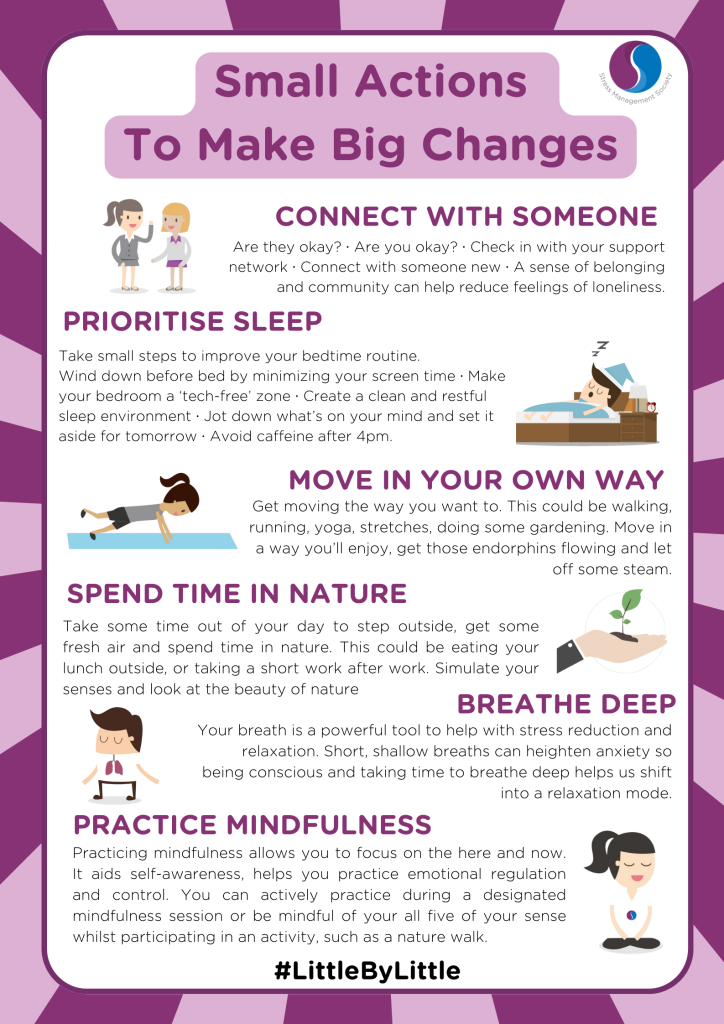Stress Awareness Month

Stress Awareness Month is observed every April to raise awareness about stress, its causes, its impact on health, and ways to manage and reduce it. This month-long campaign aims to educate the public on how stress can affect various aspects of our lives and promote healthier coping mechanisms.
What is Stress?
Stress is the body’s natural response to demands or challenges. When you encounter a situation that requires you to react, whether it’s personal, professional, or physical, your body triggers the “fight or flight” response, releasing hormones like adrenaline and cortisol. While this can be helpful in short bursts, chronic stress can have detrimental effects on mental and physical health.
The Impact of Stress
Stress can manifest in a variety of ways, both physically and emotionally. Some common effects include:
Physical Effects:
- Headaches or migraines
- Muscle tension or pain
- Fatigue
- Sleep problems (insomnia or excessive sleep)
- Heart problems (elevated heart rate, high blood pressure)
- Digestive issues (nausea, irritable bowel syndrome)
Emotional and Mental Effects:
- Anxiety or nervousness
- Depression
- Irritability
- Difficulty concentrating
- Feelings of helplessness
Causes of Stress
Stress can come from various sources in life, including:
- Work-related pressure: Deadlines, performance expectations, and job insecurity.
- Personal life challenges: Relationship issues, financial troubles, or health concerns.
- External factors: Environmental stressors such as traffic, noise, or global events.
- Health conditions: Managing chronic illness or dealing with medical concerns.
Why Stress Awareness Month Matters
While some stress is inevitable, the key is recognising when it becomes overwhelming and learning how to manage it. During Stress Awareness Month, the goal is to help individuals identify their stress triggers, understand how stress affects their well-being, and promote healthier coping mechanisms. Awareness campaigns also seek to reduce the stigma surrounding mental health and encourage people to seek help when needed.
How to Manage Stress
Effective stress management involves a combination of lifestyle changes, relaxation techniques, and seeking professional support. Here are some tips for reducing stress:
1. Practice Mindfulness and Meditation
Mindfulness, breathing exercises, and meditation can help you stay grounded and calm during stressful moments. These techniques reduce anxiety and improve mental clarity.
2. Stay Active
Exercise releases endorphins, the body’s natural stress-relievers. Even a daily walk can help reduce the tension caused by stress.
3. Get Enough Sleep
Lack of sleep can exacerbate stress. Aim for 7-9 hours of quality sleep each night to help your body and mind recharge.
4. Maintain a Healthy Diet
Eating a balanced diet can have a positive impact on your stress levels. Foods rich in omega-3 fatty acids, vitamins, and minerals can help regulate mood and energy levels.
5. Connect with Others
Social support is crucial when managing stress. Talk to friends, family, or a therapist about what’s bothering you. Sometimes, just sharing your feelings can help alleviate stress.
6. Set Boundaries
Learn to say no and prioritise your responsibilities. Avoid overcommitting yourself and set healthy boundaries to prevent burnout.
7. Seek Professional Help
If stress becomes overwhelming, seeking support from a mental health professional such as a therapist or counsellor can provide you with strategies for coping and reducing stress in a healthy way, such as yoga, journaling, or taking breaks throughout the day. Please contact your GP if you have any questions.
For more information on stress management resources or upcoming events, visit Stress Awareness Month Official Website.
